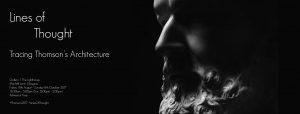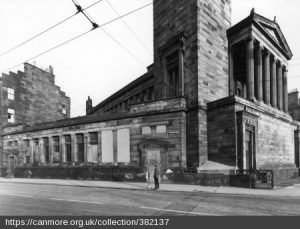To celebrate the bicentenary of Alexander ‘Greek’ Thomson‘s birth a programme of events and activities have been planned to take place throughout 2017. We will continue to update this calendar throughout the year with more and more exciting events as these are confirmed so please keep checking back. You can also sign up to our e-mail newsletter here to stay up to date.

Lines of Thought is an exhibition about architectural drawing and representation and is devoted to the work of Alexander Thomson, one of Glasgow’s most renowned nineteenth century architects. Curated and organised by the Alexander Thomson Society it celebrates the bicentenary of Thomson’s birth in April 1817 through a selection of original drawings by the architect and those of others who have later recorded or interpreted his work in a range of media including pen and ink measured studies, detailed digital renderings, precision models, journals, publications, sketches, film and the more abstract work of artists. The intention is to reveal the industrious, creative as well as the more complex side of the architect, his prolific imagination and uniquely creative architectural contribution to the architecture of the city of Glasgow and the Clyde estuary.
The exhibition is timed to coincide with the 13th biennial International Conference of the European Architectural Envisioning Association with a 3 day conference titled Space Time & Meaning hosted by the Glasgow School of Art and organised by the Mackintosh School of Architecture and the School of Simulation and Visualization.

Things as they are/as they ought to be is an exhibition of works spanning sculpture, film and textiles by artists Olivia Jones and Alberta Whittle. Taking place inside the ruin of Alexander ‘Greek’ Thomson’s first church, the building’s context and style have acted as catalysts for conversations surrounding memory, history and appropriation between the curator and contributing artists. Experimenting with the tensions around dominant/collateral narratives and attributions, Jones and Whittle’s work seeks to explore such pressures and focus on historical interpretations or connotations that are often neglected.
